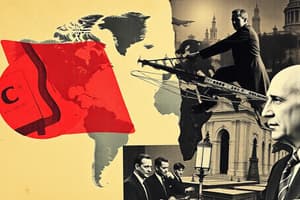Podcast
Questions and Answers
What is the primary reason for government intervention in trade to protect domestic industries?
What is the primary reason for government intervention in trade to protect domestic industries?
- To correct market failures
- To promote innovation and growth
- To protect domestic industries from foreign competition (correct)
- To safeguard national security
What is a potential consequence of protectionist measures according to critics?
What is a potential consequence of protectionist measures according to critics?
- Higher costs for consumers (correct)
- Increased competitiveness
- Faster innovation and growth
- Lower prices for consumers
What is an example of a situation where government intervention in trade is justified for national security reasons?
What is an example of a situation where government intervention in trade is justified for national security reasons?
- To correct market failures
- To protect domestic employment
- To promote innovation and growth
- To restrict trade with a country posing a security threat (correct)
What is a potential consequence of protecting industries from foreign competition according to critics?
What is a potential consequence of protecting industries from foreign competition according to critics?
What is the primary argument for government intervention in trade to correct market failures?
What is the primary argument for government intervention in trade to correct market failures?
What is a criticism of government intervention in trade to protect domestic employment?
What is a criticism of government intervention in trade to protect domestic employment?
Flashcards are hidden until you start studying
Study Notes
Protecting Domestic Industries
- Protecting domestic industries from foreign competition is a common rationale for government intervention.
- Critics highlight that protectionist measures can diminish competitiveness, leading to stagnation in innovation and economic growth.
- Tariffs and subsidies may distort market signals, resulting in inefficient resource allocation and increased costs for consumers.
National Security
- Intervention in trade is defended on the grounds of safeguarding national security.
- Governments might exploit national security concerns to justify trade restrictions that serve economic or political agendas rather than true security needs.
- Example: The U.S. government's scrutiny of TikTok based on perceived national security risks.
Protecting Jobs
- Government action aims to preserve domestic employment, especially in sectors exposed to foreign competition.
- Critics argue that such protective measures are counterproductive, as they may lead to inflated consumer prices and decrease international competitiveness.
- Protecting industries can hinder overall economic growth by creating a shield against competition.
Correcting Market Failures
- Intervention is deemed necessary to rectify market failures, including monopolistic practices that disrupt international trade dynamics.
- Such interventions aim to create a more balanced and fair trading environment but can also lead to unintended economic consequences.
Studying That Suits You
Use AI to generate personalized quizzes and flashcards to suit your learning preferences.




